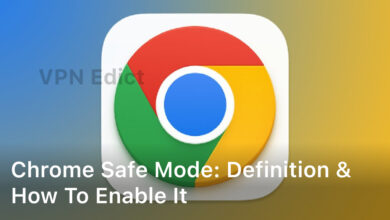
How to Choose a VPN in USA 2023 Protect Online Privacy – Learn how to choose VPN in the USA in 2023 to safeguard your online privacy effectively. Find expert advice, tips, and answers to frequently asked questions for making an informed decision.
In today’s digital age, maintaining online privacy and security is paramount. As cyber threats and surveillance continue to rise, using a Virtual Private Network (VPN) has become essential for anyone accessing the internet.
VPNs not only shield your data from prying eyes but also allow you to bypass geo-restrictions and access content from anywhere in the world. In this comprehensive guide, we’ll delve into the crucial aspects of choosing a VPN in the USA in 2023, ensuring you make an informed and safe decision.
How to Choose a VPN in USA 2023
1. Understand Your Needs and Purpose
To begin your VPN selection process, it’s essential to understand your specific requirements and goals. Ask yourself why you need a VPN. Are you primarily concerned about online privacy, bypassing censorship, accessing streaming services, or securing sensitive business data? Identifying your needs will help narrow down your options and find the best fit for you.
2. Consider Security Features
The core purpose of a VPN is to protect your online data and activities. Look for VPN providers that offer robust security features, such as AES-256 encryption, a strict no-logs policy, and support for secure protocols like OpenVPN and IKEv2/IPsec. Additional security features like a kill switch and DNS leak protection add an extra layer of protection.
3. Check Server Locations and Speed
The number and distribution of servers play a crucial role in your VPN experience. Ensure that your chosen VPN has an extensive server network, including servers in the USA and other countries you frequently access. Additionally, consider the speed of the VPN, as a slow connection can hinder your browsing and streaming experience.
4. Evaluate Privacy Policy
A reliable VPN provider should have a transparent and strict privacy policy. Review the privacy policy to understand how your data is collected, used, and stored. Avoid VPNs that log your online activities, as they may compromise your privacy.
5. Compatibility with Devices and Platforms
A versatile VPN should be compatible with various devices and operating systems. Whether you use Windows, macOS, Android, iOS, or Linux, ensure that the VPN supports all your devices and allows multiple simultaneous connections.
Keep Reading : Youtube VPN Free Unlimited Access to Your Favorite Content
6. User-Friendly Interface
A user-friendly interface is essential, especially if you’re new to using VPNs. Look for VPN providers that offer intuitive apps and easy-to-navigate settings, ensuring a hassle-free experience.
7. Customer Support
Reliable customer support is crucial when dealing with technical issues or queries. Opt for VPN providers that offer 24/7 customer support through various channels like live chat, email, or phone.
8. Pricing and Plans
While cost shouldn’t be the sole factor in your decision, it’s essential to find a VPN that fits your budget. Compare different pricing plans and subscription options to get the best value for your money.

9. Free vs. Paid VPNs
Free VPNs may seem enticing, but they often come with limitations and security risks. Paid VPNs usually offer more features, better performance, and enhanced security, making them a safer choice for protecting your data.
10. Reputation and Reviews
Research the reputation of the VPN provider by reading reviews from both experts and users. Look for real-life experiences and testimonials to gauge the reliability and performance of the VPN.
11. Trial Periods and Money-Back Guarantee
Consider VPNs that offer a trial period or a money-back guarantee. This allows you to test the service risk-free and ensure it meets your expectations before committing long-term.
Keep Reading : Twitter is Now X, Here What That Means
12. Extra Features and Add-ons
Some VPNs offer additional features like split tunneling, ad-blocking, and malware protection. If these features align with your needs, it might be worth considering them in your decision-making process.
13. Avoid VPNs with Malicious Intent
Be cautious of VPNs that seem too good to be true or make unrealistic claims. Some VPNs might be fraudulent or have malicious intent, potentially putting your data and privacy at risk.
14. Legal and Jurisdiction Considerations
Check the VPN provider’s jurisdiction and the laws governing their location. Opt for VPNs based in countries with strong data protection laws and a track record of respecting online privacy.
15. Test the VPN’s Performance
Before making a final decision, test the VPN’s performance with a free trial or a money-back guarantee. Evaluate its speed, stability, and overall performance to ensure it meets your expectations.
16. Seek Recommendations and Referrals
Ask friends, colleagues, or online communities for VPN recommendations based on their experiences. Referrals from trusted sources can often lead you to reliable and effective VPN services.
17. Avoid VPNs with Bandwidth Caps
Some VPNs impose bandwidth caps, limiting your data usage. Avoid such restrictions if you plan to use the VPN extensively or for streaming and downloading.
18. Analyze Customer Support Quality
Reading customer reviews about the VPN’s customer support can give you insights into how prompt and helpful they are in resolving issues.
19. Read the Fine Print
Carefully read the terms and conditions of the VPN provider to understand any limitations or hidden clauses.
20. Trust Your Instincts
If something feels off about a VPN provider, trust your instincts and explore other options.
FAQs
Are VPNs Legal in the USA?
Yes, using a VPN is legal in the USA. However, illegal activities carried out while using a VPN remain unlawful.
Can I Use a Free VPN Instead of a Paid One?
While free VPNs are available, they often come with limitations and may compromise your online security. Paid VPNs generally offer better features and security, making them a safer choice.
Will a VPN Affect My Internet Speed?
Using a VPN can potentially affect your internet speed due to the encryption and rerouting of your data. However, a high-quality VPN will minimize speed loss.
Can I Access Geo-Restricted Content with a VPN?
Yes, a VPN can help you access geo-restricted content by routing your internet connection through a server in a different location.
Should I Always Use a VPN for Privacy?
Using a VPN for privacy is recommended, especially when accessing public Wi-Fi networks or browsing sensitive data.
Can I Use a VPN on Mobile Devices?
Yes, most VPNs are compatible with mobile devices, including smartphones and tablets, ensuring your online activities remain secure on the go.
Conclusion
Choose VPN in USA in 2023 is essential to safeguard your online privacy and enjoy unrestricted internet access. By considering factors like security features, server locations, customer support, and user-friendliness, you can find a VPN that perfectly aligns with your needs and preferences. Remember to prioritize reliability and privacy when making your decision, and ensure the VPN you choose adheres to strict privacy policies and doesn’t log your online activities.
Moreover, always prioritize paid VPN services over free ones, as they offer better security, faster speeds, and more reliable performance. While free VPNs might seem tempting, they often come with limitations, bandwidth caps, and potential security risks, which could compromise your online safety.
When considering a VPN, take advantage of trial periods or money-back guarantees to test the service before committing to a long-term plan. This way, you can evaluate its performance and ensure it meets your expectations.
Before finalizing your decision, seek recommendations and referrals from friends, colleagues, or online communities who have firsthand experience with VPN services. Trusted referrals can lead you to reliable and effective VPN providers.
Additionally, research the reputation of the VPN provider by reading reviews from experts and users alike. Real-life experiences and testimonials can provide valuable insights into the reliability and performance of a VPN.
It’s essential to consider the VPN’s jurisdiction and the laws governing their location. Opt for VPNs based in countries with strong data protection laws and a track record of respecting online privacy.
Remember, if something feels off about a VPN provider, trust your instincts and explore other options. Online security is not something to compromise on, so always prioritize your peace of mind.





